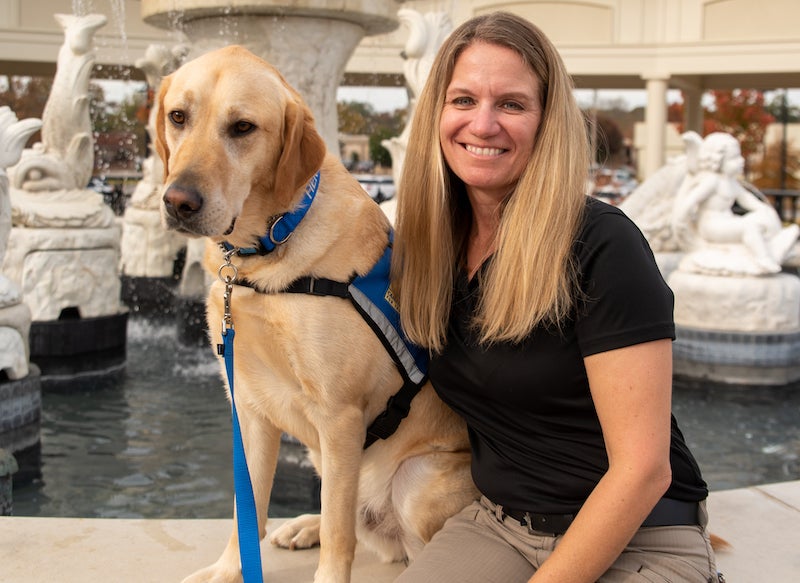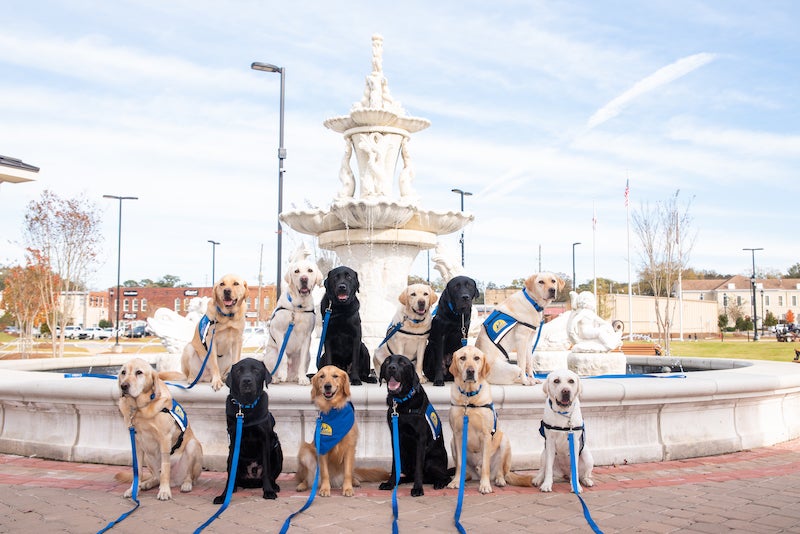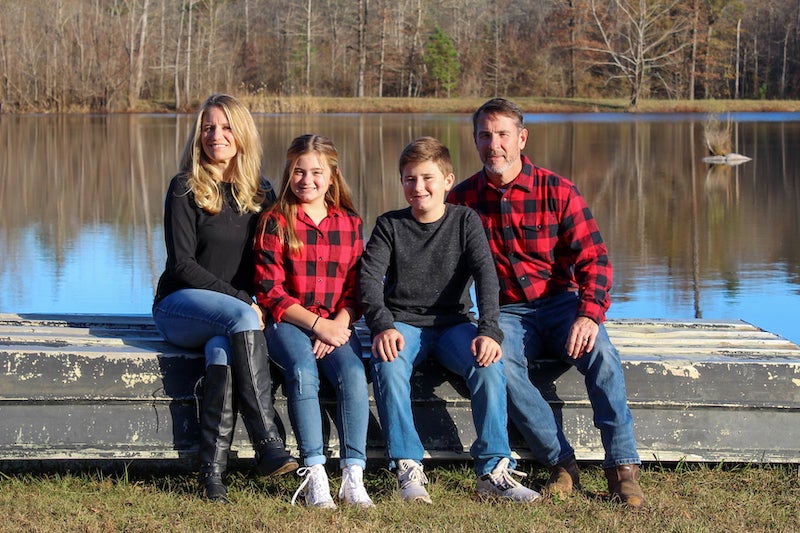PROFILE: Harnessed Resilience – Here’s the story of a special dog, a nonprofit and the person behind them
Published 6:26 pm Tuesday, March 29, 2022

- By day, Tonya is the handler for Fitzgerald II, on the side she has a very big side project as the president of The Wings of Hope Pediatric Foundation. (Reporter Photos/Keith McCoy)
|
Getting your Trinity Audio player ready...
|
By Meg Herndon
Photos by Keith McCoy
You can learn a lot about Tonya Willingham by looking around her office. Photos of her family crowd the wall above her desk. A couch sits across the room, begging anyone that sits on it to sink in and take nap. Beside it, a shelf is lined with coloring books, crayons, books and games. A 4-year-old golden retriever-lab mix is curled up on his dog bed below a scribbled on whiteboard.
That dog is Fitzgerald II, and Tonya will happily tell you anything you want to know about him for as long as you are willing to listen.
But Tonya would rather not talk about herself. She made this very clear when after three phone calls and an email later, she finally agreed to be interviewed for this article—with the condition that the story be less about her specifically and more about her job and the nonprofit she cofounded instead.
“That’s Tonya,” says Sergent Brad Jordan with the Pelham Police Department, who has worked with Tonya for over 15 years. “She’s never in it for the glory, but what she does has an impact.”

Fitzgerald II
By day, Tonya is the handler for Fitzgerald II, lovingly referred to as Fitz, is one and only Shelby County resident facility dog and one of only seven certified facility dogs working in the state of Alabama. To sum it up, Fitz has quite the job security.
Despite loving what she does now, Tonya did not go to college to be a dog handler. She started her career as a police officer, eventually going to law school and becoming the assistant district attorney in Shelby County in 2006. The job, while rewarding, was also taxing. “I was stressed out. If you ask some of the defense attorneys around here, they’d probably tell you that I wasn’t very nice.” Tonya says, chuckling at her past self.
It was in 2014 that Tonya first encountered a courthouse canine in her line of work while at a conference for continuing legal education. Willow, the first facility dog in the state, was part of a presentation on using dogs in the courthouse that stuck with Tonya.
“At the time, I was like, ‘This is genius!’” Tonya says. “What the dogs do for the kids and any witness (is) huge. Having watched people struggle for so long, I thought, ‘Man, that would just be a great asset that we could bring to our office for the victims that we serve up here.’” Eventually, in 2018, the Office of Prosecution Services wrote and was awarded a Hero Grant, and when Tonya was approached by the DHU, she “jumped at it.”
After completing two weeks of training in Texas with Canine Companions, Tonya came home with Fitz. His two years of training before that values him at around $50 to $60,000 in addition to his $1 million insurance liability. So basically, Fitz is a very big deal.
He is still technically owned by Canine Companions, so he has special rules he has to follow. He has to get his teeth brushed every day, he cannot be outside in an unfenced area without a leash unsupervised, he has special exercises he has to do and, much to Fitz’ dismay, he cannot play tug-of-war.
He can, however, play basketball, bowl, color, retrieve books, play cards, close and open refrigerators, give you a kiss, you name it. “He’s pretty amazing,” Tonya admits.
But still, Fitz knows that when Tonya puts on his work vest, collar and the occasional bowtie if he has to work during a trial, it’s go time.
With a 40 hour work week, Fitz assists clients in a criminal justice setting. He helps crime victims, witnesses and others who might need him to help mitigate their stress and anxiety in various settings and through forensic interviews, medical exams and court hearings.
Tonya and Fitz mainly work in child advocacy centers like Owens House, a non-clinical setting house where children can feel comfortable while being interviewed or examined.
“I know personally, with the forensic interviews that I’ve done since we have been using Tonya and Fitz in those, I’ve gotten a much better rapport with my clients, they’re so much more at ease,” says Maribeth Bowman, a forensic interviewer for Owens House. “Just the other day I asked a child, ‘So how are you doing now that we’ve talked?’ and she said, ‘Oh well having this dog here has been so great.’”
In the first-ever medical exam that Fitz was assigned to, Tonya placed Fitz in the room on his bed and then left. During interviews and exams, Tonya is never present. An hour had gone by, and Tonya sat there thinking, “Wow, I do not know how long this is supposed to take.”
The nurse came out and told Tonya that the child would not undress so that they could begin the exam and then asked, “Do you think Fitz would put on one of our gowns?” “So I put Fitz in a gown, put him back in the room, and within 30 minutes the child had undressed and they had finished the exam,” Tonya recalls.
Although Tonya is not personally in the rooms comforting victims, her role is just as important. “She knows what to do and that’s worth its weight in gold to me,” Brad says. “She is able to go in there and introduce the child to Fitz. I don’t know how she does it, but even (for) some of these children that are more hesitant around animals, within a matter of seconds, boom! They’re attached to Fitz. Whatever unspoken bond they’ve got together it’s pretty interesting to watch how they operate together.”

Wings of Hope
While Fitz and Tonya both have big jobs, Tonya also has a very big side project as the president of The Wings of Hope Pediatric Foundation. She helped start the nonprofit in 2010 after losing not one but two children to Spinal Muscular Atrophy, a genetic disease that affects the central nervous system, peripheral nervous system and voluntary muscle movement, or, as Tonya describes it, Lou Gehrig’s for kids. Children with it are born with the most strength that they will ever have, but as they grow their bodies lose strength. Their lungs never fully develop, so they lose the ability to breathe and eat.
In 2006, Tonya and her husband David lost their first child, Piper, to SMA Type 1 after a five-month battle and 10 weeks after being diagnosed. Then, in 2009, Tonya had twins, Julia and Hanna. Julia was healthy, but Hanna was diagnosed with SMA as well.
At the time, Hanna was placed in hospice care with Hospice Complete, the only one in the area that took pediatric patients. Through that care, she met Doctor Dan Trotman and Stephanie Miller, R.N., and all three agreed that there was a need for an organization that could step in and helps families with day-to-day tasks in order to give families more time together.
“I have these two healthy kids, I was trying to work. I eventually took some time off work, but like, how do you focus on taking care of your sick child and cook, cut the grass, doing those kinds of everyday tasks?” Tonya recalls thinking.
When Tonya did stop working, she was thinking about where would get money for all they had to pay for their regular bills along with medication and other expenses. “We have been blessed. My husband has a good job, but (some people) who quit work don’t have money coming in,” she notes. “Or maybe you do have two incomes, but when you cut one and come down to one income, it isn’t enough to pay everything. So not only are you worried about your kid that is dying, but you have to worry about all these other things.”
That’s where Wings of Hope comes in. Above all, Tonya wanted the families to focus on creating memories rather than worrying.
Now Wings of Hope, families or social workers will fill out an application that is not based on what the family needs, not finances. For example, if a family wants their house cleaned Tonya or a volunteer will clean their house. If a volunteer is not able to clean the house, then they will hire a cleaning service to do so.
Occasionally, a local service provider will hear about Wings of Hope and offer its services free of charge to families in need. For instance, a lawn service heard about the nonprofit through Rick and Bubba’s Charity Charge and offered to provide free lawn services to families in its zip code.
“We put tires on cars. We pay car insurances. We recently had a mother whose car was repossessed, so we paid everything to get the car back to her. We’ve bought stoves. We bought washing machines,” Tonya lists off. “You know these families are coming to us with something they need to carry on life, asking us to help relieve their financial burden, so we are helping with that.”
One Christmas, a child wanted to come home from the hospital, but the family could not afford the medications that the kids needed. The hospital was not going to send the child home without their medicine, so Wings of Hope paid for it so that the child could celebrate the holidays at home.
As of October 2021, Wings of Hope Pediatric Foundation has helped 63 families, with Tonya serving at its help as president of the nonprofit since 2021 after Dan, the former president, passed away.

Cause and Effect
Since Tonya wanted us to focus this article on Fitz and Wings of Hope, we had to ask others to learn more about her.
“Everything that she does is about making sure that people are taken care of and that their needs are met, either emotionally or monetarily, and she never hesitates to pitch in when she needs to,” Maribeth says. “She never hesitates to help somebody.”
Brad echoes a similar sentiment. “I love what she’s done,” says Brad. “And it surprised me at first cause it was a huge step, taking what she’s known at the District Attorney’s Office and going down this route. But I am so glad she did because it’s benefitted all of us and it wouldn’t be there it weren’t for her so I think we all owe her.”
Both agree that teamwork is key to what she does. Tonya says that Fitz has helped her too, calming her down and making her less stressed as she goes about life and working through her own trauma as they work with others. “Working with him,
I have learned a lot about how kids and just people, in general, will work through their trauma,” Tonya says “Through some of these kids, you can see how they’re resilient and they can take a bad thing and turn it around and still move forward with their life and do good things.”
Tonya likes to ask people who have worked with Fitz to describe him in one word. Some answers are stuck to her corkboard behind the couch in her office: Courageousness. Soft. Loving.
What about an answer for Tonya though? We’d say: selfless.









